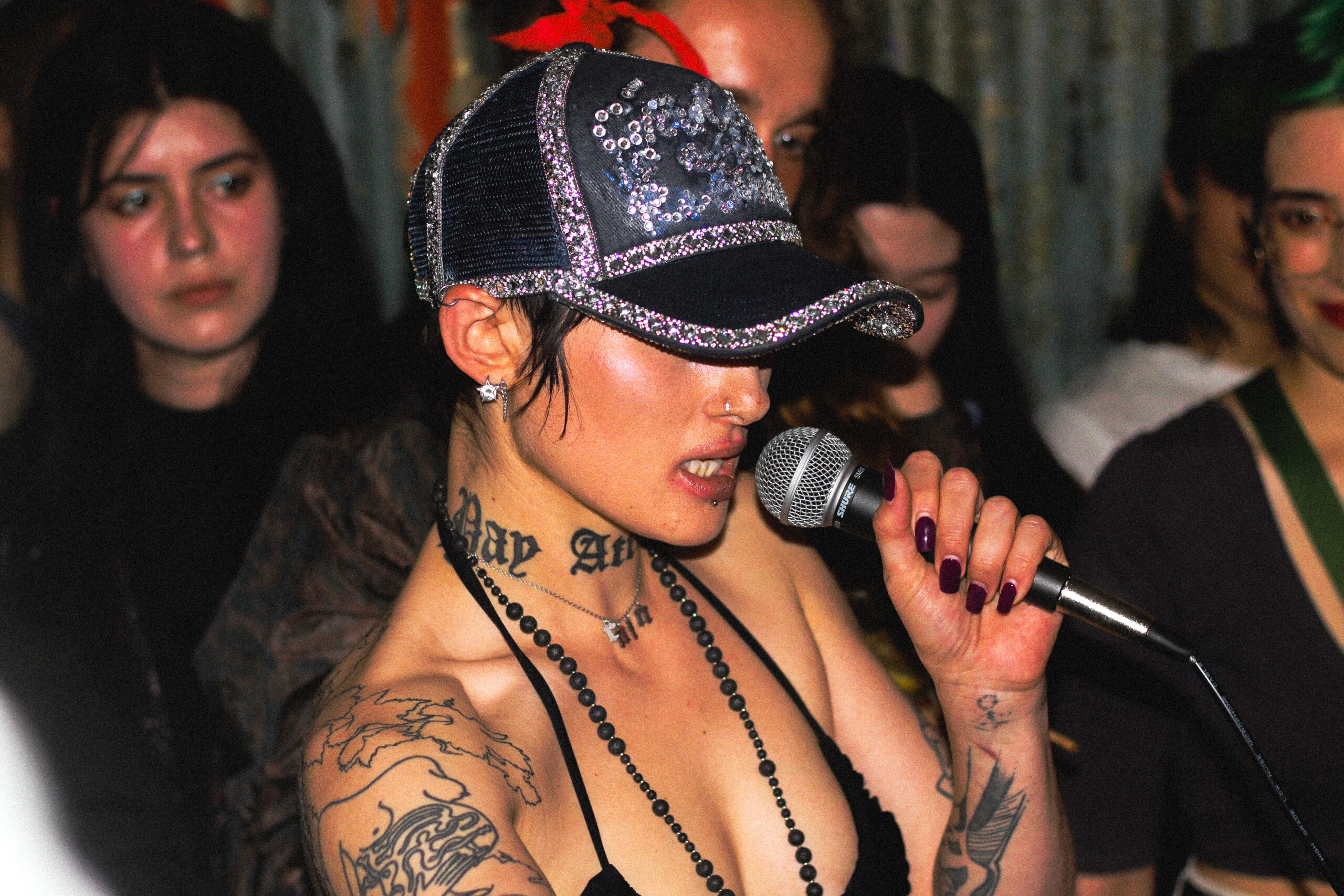To compliment the upcoming YEOJA + Transmodernity workshop that Dasa and Chiqui are holding on…
Ruin Klarity
Ruin is what remains20 July 2023
Ruin Klarity (@ruin_klarity ) is a writer, performer, community organiser and pain and care researcher. YEOJA chatted with Ruin about their work as founder and organiser of the Sex Workers Action Group (SWAG), Berlin Collective Action, the former Radiant Love Berlin rave and their recent massage practice Cypher Methodology in Paris.
Hi Ruin Klarity! If it’s okay with you, I’d like to start by asking you about your name. Could you enlighten us on how you arrived at Ruin Klarity and what it means to you?
I chose my name and it was given to me. I chose the alias after I danced to an image shared by my longest lasting teacher Stefano Taiuti, in a butoh workshop in Poland. The image was created and shared with him by Masaki Iwana, RIP amen. A prostitute named Ruin…and so it was, I was born. Ruin was born out of capitalism, and surviving in its hell. Ruin doesn’t have an inner child, in some ways it was liberating to have a second life for a moment. Clients ask me about my name all the time, my reply is always the same. “Ruin, broken but still standing, how romantic,” they love it, it adds to whatever fantasy of me they have in their heads.
Klarity came later when I was at a rave. A friend of mine told me that Ketamine brings clarity, made sense. Klarity truly completed the image, I always felt misunderstood and simultaneously like I didn’t understand. That there was a kind of cosmic joke I just didn’t get. So, the name stuck.
In 2020, you co-founded Sex Workers Action Group (SWAG) against the stigma and criminalisation of sex workers, specifically to fight against the Nordic Model and for decriminalization. For those who do not know, how would you describe the current legal landscape for sex workers in Berlin?
Currently in Germany, sex workers live in a state of semi-legality where their lives are under constant surveillance under the Prostituiertenschutzgesetz (ProstSchG, 2017). Evaluation of this law started in 2022 and a decision will be made in 2025.
Sex work in Berlin is legalised but not decriminalised, it is called The Prostitutes Protection Act 2017 and we have to obtain a Huren Pass. A Huren Pass is a separate identification you must carry with you at all times. There are many aspects of the pass that are criminalizing. Police in Germany can search you at any moment under the suspicion that you are a whore. When registering you also allow police autonomy to enter into your home. In Germany, when registering your body as your business they have the right to spontaneously check on your business. This was one of the main reasons sex workers were fined up to 5,000 euros during covid times, whilst sex work was illegal. Trans street-based sex workers at the time were fined up to 500 euros for just walking in the street in the red light district of Berlin. These fines were not given during any proof of transaction but even whilst trans women were waiting outside of OLGA e.V, an organization in the redlight district that supports street-based sex workers in the area. Legalization without decriminalization still means criminalisation, branding and discrimination.
Could you tell us about why it is important to fight for both the destigmatisation and decriminalisation of sex work?
If you want a world with less violence you will fight for the destigmatization and decriminalization of any work, race, gender, orientation, migration, substances, disabilities and so on. Evaluation of the current Prostitutes Protection Act 2017 has started in 2022 and Germany must present its new position towards sex work by 2025. Fighting for decriminalization is the safest option for sex workers, however the fear and the agenda of far right conservatives is to push for the Nordic Model, which criminalizes not only the worker but the client, and even those close to the worker such as roommates. The point is that sex work is constantly painted as a moral issue, when it is a labour issue. We can not destigmatise and decriminalise sex work until we destigmatise and decriminalise sexuality, as well as normalising sex education. Here are some bullet points on why the Nordic Model is harmful towards sex workers, put together by Sex Worker Action Group:
- It takes power away from sex workers in working interactions which become controlled by the needs of the criminalized clients who fear arrest.
- Prevents sex workers from establishing better working conditions because their job is not considered a job anymore.
- Increase of stigma that sex workers already experience.
- Legitimisation and increase of negative attitude and violence against sex workers by civil society.
- Increases vulnerability to exploitation as clients can no longer report suspected victims of trafficking due to fear of prosecution.
- Prevents sex workers from accessing legal, social and health services (especially when migrant and/or BPOC and/or LGBT).
- Makes it impossible to separate sex workers and victims of trafficking.
- Generates impunity for those who commit crimes against sex workers.

With Berlin Collective Action you call for the participants of Berlin nightlife and club culture to take accountability for their role in the gentrification of Berlin, recognising its club culture as a culture of capitalism. Could you explain how the current clubbing climate specifically and disproportionately affects sex workers?
One of the projects BCA is currently in support of and passionate alignment with is the Redlight Walks. These tours are a direct extension and outcome of the community support that has been provided by the collectives to the workers on the street. The tours give the perfect example of how gentrification is harmful and violent towards those that experience criminalisation and discrimination.
In 2022 we made the decision to stop collaborating with party/nightlife collectives. This was because of the lack of involvement, participation or interest expressed by the collectives that had signed off on the mission of BCA.
The only thing that sets Berlin apart from any other city is its club culture and nightlife these days, along with its opening hours which is directly connected to its normalization of substance abuse. This is all made possible because of the institutionalization of clubbing. It has been made very clear to us that Berlin nightlife led by Clubcommision is more down to profit off of the wellbeing of its residents and sell Berlin to tourists than provide any form of care, harm reduction or radical change for its residents.
Here is a link to our full transparency report of 2022, where you can read further about the decisions we have made and what we have witnessed.
What actions can we take to offset the harmful impact that Berlin club culture has and how do we support the groups that are disproportionately affected by this?
You can’t offset it, it’s clubbing capitalism. All you can do is cultivate awareness and support with skills and access. You can take action in providing a bit of pain relief for those in more precarious situations than you, donate your time, if you have money you can redistribute some of it, or hire people to do some under the table work for you.
You recently facilitated the workshop The Lovers’ Dialogue, an open approach to substance use and care based on experiences and research collected and conducted during your years at Radiant Love. One of the questions the workshop delves into is how an open approach to substance use and language can inform harm reduction and awareness team support. Could you share with us some insights of The Lovers’ Dialogue?
My experience is that when you take away the policing of substances your crowd feels respected and takes more accountability for their usage. All that energy that is put into policing people instead is replaced with care and educating a community about safer use, harm reduction and the substances they are consuming. Open substance use policies facilitate a dialogue amongst a community and therefore a consciousness. Using non-policing language, not assuming the kind of care someone might need, and not making them a problem for having an experience of a substance but accompanying them through it are all factors that support someone in regulating their nervous system faster.
Another question the workshop posited is in which kind of spaces such an approach might be possible and why. While the question of space remains open-ended, what kind of spaces do you hope to envision for Berlin at this moment?
An open substance policy can never work in a club space. Club spaces and their security staff know very well that there are people using inside, but they police it because that is what institutionalized capitalist clubbing is. The clubbing in Berlin is a machine, it is a beast, clubs do not want to take accountability for the bodies they have inside, or the behavior they let slide. That is why there are party collectives, unfortunately there are very few spaces left in Berlin post-COVID for the underground. I hope this changes, so that young queer people can have a voice in the city, to create little pockets of care and pain relief for their community through music and dance.
I hope Berlin’s underground is reborn. Express yourself, take risks, take space, take to the streets to say fuck you cause that is where you find momentum in the city, it will feed you there. Give yourself love and care. Protect yourself, your loved ones, the freaks, the outcasts, the marginalized and the outlaws. Those who can take risks, take them, for those who can’t, it’s the only way we achieve any form of liberating anything. Move with purpose and know why you do what you do.
Which areas in your life do you currently find joy/flow/wellness in?
When I am inspired I am most myself. Inspiration and the admiration for other peoples art and research is louder than all the critical internal voices I have. It is the most powerful substance I know, so I am trying to focus, listen, find it and flow from the moment I feel that fullness. Expressing oneself, being vulnerable and courageous to be yourself is so inspiring to me. Currently I am most inspired by my collaborations So Klarity, KLARITY CLINIC, BCA and writing for publication DRAFT001 as Emma is Ruined. Furthermore I love holding space for people through my massage practice and bodywork research, it brings me purpose to share care through touch.
What are you working/writing on at the moment?
I have just moved to Paris, I am performing weekly at Sweet Paradise, a cabaret striptease and continuing my massage practice Cypher Methodology. I offer wellness and hot stone massage, and I have a sliding scale for QTBIPOC, SWers and people with disabilities. I am researching pain, chronic pain and pain relief. I am currently writing and processing the theme of ‘fear of abandonment’. And as far as what is in the mix of work to be published in the coming months; So Klarity – Volume 2 will be released on Delicate Records and stay tuned for video, art and mix series KLARITY CLINIC.
Thank you, Ruin!








